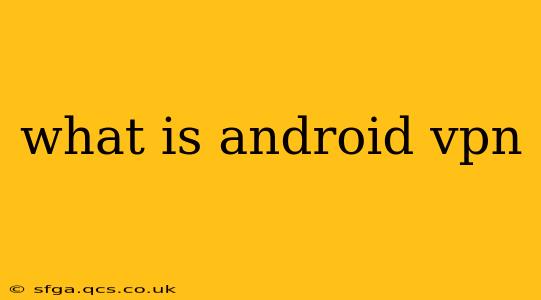An Android VPN, or Virtual Private Network, is a security app that creates a private and encrypted connection between your Android device (phone or tablet) and the internet. Think of it as a secure tunnel protecting your online activity from prying eyes. Instead of your data traveling directly to websites and apps, it's routed through a VPN server, masking your IP address and encrypting your data. This added layer of security offers several key benefits for Android users.
Why Use an Android VPN?
Using a VPN on your Android device offers several compelling reasons:
-
Enhanced Privacy: Your internet service provider (ISP), government agencies, and hackers can't easily see what you're doing online. The VPN encrypts your data, making it unreadable to anyone intercepting it. Your real IP address is hidden, replaced by the IP address of the VPN server. This is particularly important when using public Wi-Fi networks, which are notoriously insecure.
-
Improved Security: A VPN adds a significant layer of security, especially on unsecured Wi-Fi hotspots. It protects your data from malicious actors who might try to steal your passwords, credit card information, or other sensitive data.
-
Bypass Geo-Restrictions: Many websites and streaming services restrict content based on your geographical location. A VPN allows you to connect to servers in different countries, thereby circumventing these restrictions and accessing content that might otherwise be unavailable in your region. This is a popular use case for accessing streaming services with different libraries.
-
Increased Anonymity: VPNs mask your IP address, making it more difficult to track your online activity. This can be important for users concerned about their online privacy and anonymity.
What are the different types of Android VPNs?
While the core functionality is the same, there are different types of VPNs available, each with its own strengths and weaknesses. The most common are:
-
Free VPNs: These are often limited in bandwidth, speed, and server locations. They may also contain intrusive ads or sell your data to third parties. Proceed with caution when using free VPNs.
-
Paid VPNs: Paid VPNs usually offer faster speeds, more server locations, better security features, and stronger privacy policies. They are generally a safer and more reliable option.
-
PPTP, L2TP/IPsec, OpenVPN, WireGuard: These are different VPN protocols, each offering a trade-off between speed, security, and ease of use. OpenVPN and WireGuard are generally considered more secure.
How to Choose an Android VPN?
Selecting the right VPN for your needs involves considering several factors:
-
Security and Privacy Policy: Look for a VPN provider with a strong privacy policy that explicitly states they do not log your activity. Independent audits of the provider's security practices can add an extra layer of assurance.
-
Server Locations: A wider range of server locations gives you more flexibility in bypassing geo-restrictions and optimizing connection speeds.
-
Speed and Performance: A slow VPN can be frustrating. Check reviews and benchmarks to ensure the provider offers acceptable speeds.
-
Device Compatibility: Make sure the VPN app is compatible with your Android device and version.
-
Customer Support: Reliable customer support can be crucial if you encounter any problems.
What are the risks of using a VPN?
While VPNs offer many benefits, it's crucial to be aware of potential risks:
-
Data breaches at the VPN provider: Although rare, there's a possibility that a VPN provider's servers could be compromised, leading to a leak of your data. Choosing a reputable provider with a strong security track record is crucial.
-
Slower connection speeds: VPNs can sometimes slow down your internet connection, especially if the server is far away or heavily loaded.
-
Malware in free VPN apps: Some free VPN apps might contain malware or spyware. It's essential to download apps from reputable sources, such as the Google Play Store, and to carefully review user reviews.
-
VPN providers logging user activity: Although many VPNs claim a no-logs policy, it's essential to verify this independently and choose providers you trust.
In conclusion, an Android VPN is a valuable tool for enhancing your online privacy, security, and access to content. By carefully selecting a reputable VPN provider and understanding its limitations, you can enjoy the many benefits it offers. Remember to research different options and read reviews before making your choice.
